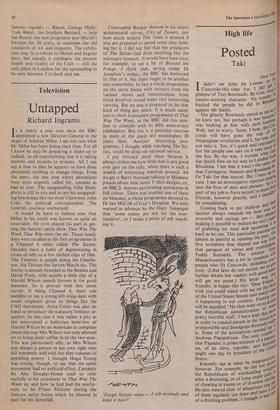Television
Untapped
Richard Ingrams
I t is nearly a year now since the BBC appointed a new Director-General in the shape of Alastair Milne. I am not sure what Mr Milne has been doing since then. For all I know he may be preparing a shake-up so radical, so all-transforming that it is taking months and months to prepare. All I can say is that to date he appears to have done absolutely nothing to change things. Even the news, the one area where alterations were most urgently called for, remains as bad as ever. The unappealing John Hum- phrys is still in situ and so are his unappeal- ing henchman like the dour Ulsterman John Cole, the political correspondent. The funerals continue unchecked.
It would be hard to believe now that Milne in his youth was known as quite an innovator. He even played his part in get- ting the famous satire show That Was The Week That Was onto the air. Those heady days were recalled in the first programme in a Channel 4 series called The Sixties. Decades have a habit of degenerating in terms of telly to a few cliched clips of film. The Twenties is people doing the Charles- ton, the Thirties the Jarrow March etc. The Sixties is already branded as the Beatles and David Frost, with maybe a little clip of a Harold Wilson speech thrown in for good measure. So it proved with this latest survey. It being Channel 4, there was needless to say a strong left-wing slant with much emphasis given to things like the CND movement. Anna Coote was also on hand to introduce the statutory feminist se- quence. In this case it was rather a pity as she interrupted a ludicrous interview of Harold Wilson by an American to complain about the way Mrs Wilson was only allowed on to bring some coffee in to the two men. This was particularly silly, as Mrs Wilson was always a person in her own right who did extremely well with her slim volumes of appalling poetry. I thought Hugo Young was wrong, though, to say that the satire movement had no political effect. Certainly Sir Alec Douglas-Home used to refer ruefully in his retirement to That Was The Week etc and how he had had the misfor- tune to be Prime Minister during the famous satire boom which he blamed in part for his downfall. Christopher Booker showed in his recent architectural survey, City of Towers, just how much archive film there is around if you are prepared to spend some time look- ing for it. I did not feel that the producers of The Sixties had done anything like the necessary research. It would have been nice, for example, to see a bit of Beyond the Fringe. I think that, acting under Dr Jonathan's orders, the BBC has destroyed its film of it, but there ought to be another one somewhere. In fact a whole programme on the satire boom with extracts from the various shows and reminiscences from those involved would make very interesting viewing. But no one is prepared to do that kind of thing any more. It is much easier just to show a complete programme of That Was The Week, as the BBC did this sum- mer to coincide with its 60th anniversary celebration. But this is a pointless exercise as most of the jokes are meaningless 20 years later. Another interesting pro- gramme, I thought while watching The Six- ties, could be done on national service.
I put forward these ideas because it always strikes me how little that is any good ever gets on the telly, when there is such a wealth of interesting material around. All we get is Barry Norman talking to Milanese pseuds about their latest T-shirt designs, or, on BBC2, doctors performing operations in full colour. There was another one of these on Monday, a whole programme devoted to Dr Ian McColl of Guy's Hospital. We were warned in advance by the Daily Telegraph that 'some scenes are not for the over- sensitive', so I made a point of ndt watch- ing it.
'Forget history mate — I rob anybody and keep it now!'










































 Previous page
Previous page